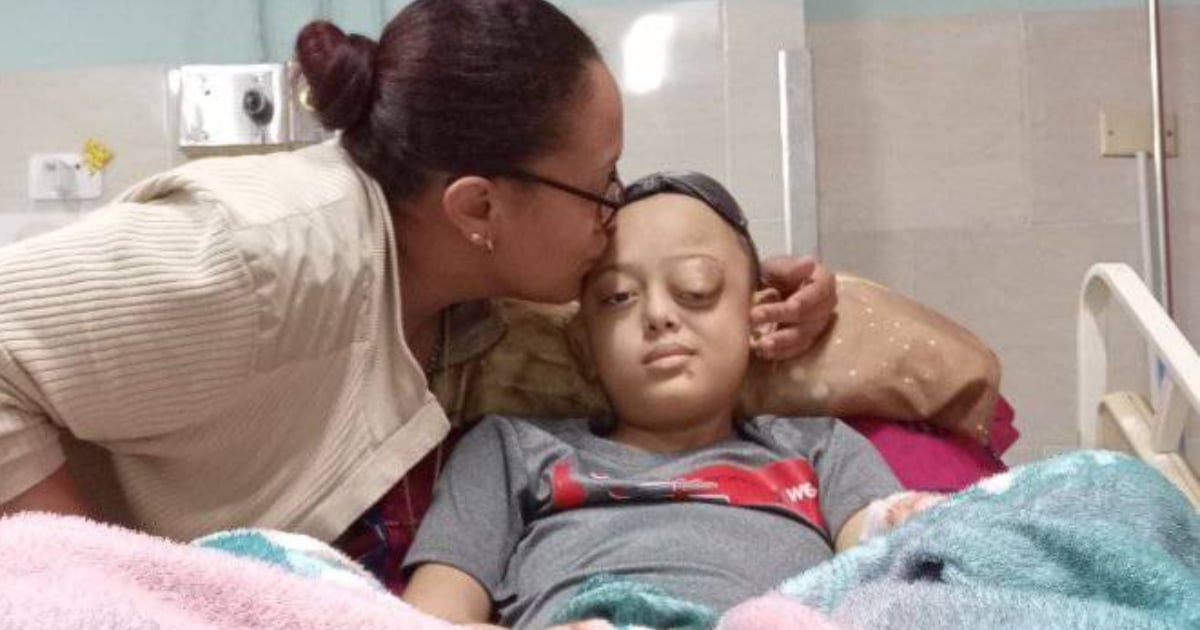The Cuban government is attempting to use the case of young Damir Ortiz Ramírez as a showcase for its healthcare system. The 10-year-old boy is suffering from a serious illness that necessitates specialized treatment unavailable on the island, yet the authorities have refused to allow his transfer to another country, arguing it might worsen his condition.
On Thursday, Damir and his mother, Eliannis Ramírez, visited the U.S. Embassy in Havana to request a humanitarian visa after a Miami hospital agreed to treat him. However, the embassy denied the visa due to missing documentation from the Ministry of Public Health (MINSAP).
Diagnosed with neurofibromatosis type 1, Damir has a plexiform neurofibroma affecting his right eye and is also being evaluated for potential leukemia. Following the media attention his case has garnered online, the government released an editorial claiming Damir as an example of the specialized care and resources invested in complex medical cases.
"From the beginning of his illness, the child has received specialized medical attention. He has also had access to high-tech diagnostic tools, such as a high-field Magnetic Resonance Imaging (MRI). The Ministry of Public Health in Cuba purchased a year's supply of Koselugo (selumetinib), the first and only drug targeted for the treatment of NF 1, at a cost of $500,000," reported the government-aligned portal "Razones de Cuba" on Facebook.
The government insists that the family has been consistently informed about Damir's diagnosis, treatment options, and life expectancy. They argue that due to the complexity of his condition, transferring him poses significant risks, including potential life-threatening complications such as cardiac arrest.
In recent days, Damir's situation has been distressing for his mother, as he remains in intensive care at Juan Manuel Márquez Pediatric Hospital in Havana, suffering from kidney damage and eye inflammation. Activist Yamilka Laffita, known as Lara Crofs, reported initial resistance from medical staff to provide a wheelchair, which was eventually obtained, beginning another challenging process to arrange an ambulance transfer to the U.S. Embassy.
Diasniurka Salcedo Verdecia, an activist based in the United States, has launched a GoFundMe campaign aiming to raise $40,000 to cover treatment and travel expenses. She emphasized that Damir could receive treatment in a Miami hospital, where therapies unavailable in Cuba are accessible.
Damir's case came to public attention in August 2023, with his mother tirelessly advocating for necessary surgery. However, Cuban neurosurgeons have stated the tumor has extended to inoperable brain areas, and Eliannis has openly criticized the public health system and bureaucratic hurdles obstructing medical care on the island.
The situation has sparked a wave of solidarity among the Cuban community and human rights activists, who continue to demand responses from MINSAP and international support to save Damir's life.
Frequently Asked Questions about Damir Ortiz Ramírez's Case
What illness does Damir Ortiz Ramírez suffer from?
Damir Ortiz Ramírez has been diagnosed with neurofibromatosis type 1 and is also being evaluated for possible leukemia.
Why was Damir's humanitarian visa request denied by the U.S. Embassy?
The U.S. Embassy denied the humanitarian visa request due to the lack of necessary documentation from Cuba's Ministry of Public Health.
What has been the Cuban government's response to Damir's medical situation?
The Cuban government claims that Damir's case exemplifies the specialized medical care available in the country and has argued against his transfer abroad due to potential health risks.
